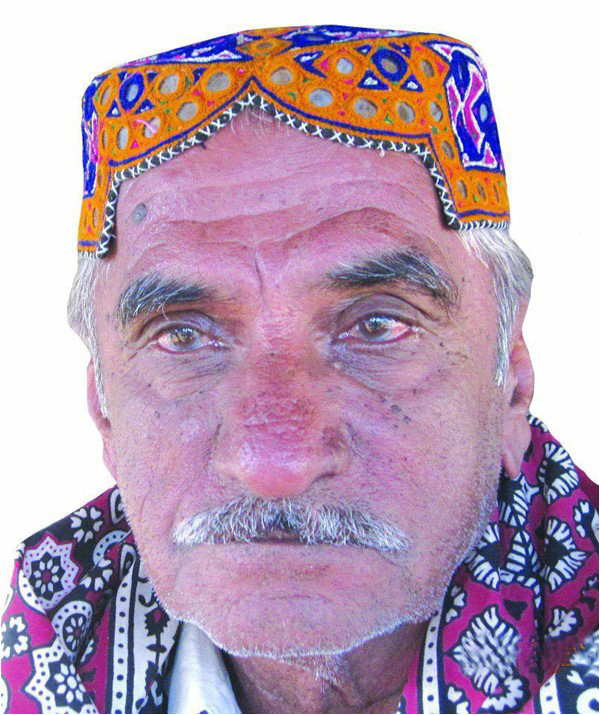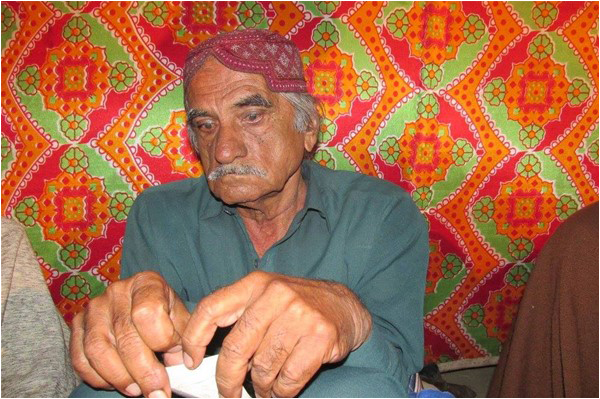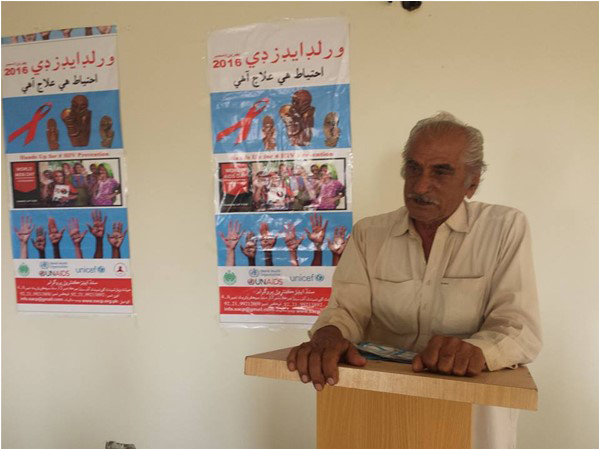“I did the election campaign for Mohtarma Fatima Jinnah, accompanied by Shaheed Fazil Rahu at that time when Zulfiquar Ali Bhutto was carrying out an election campaign for dictator Ayub Khan!”
Muhammad Moosa Jokhio swells with pride as he recalls his half-century-old memories.
Jokhio has spent almost his whole life (or at least a good part of his life) with Shaheed Fazil Rahu, a renowned leftist peasant leader of Sindh. Being a national worker and secretary of ‘Neelam Band Karyo Tehreek’, Muhammad Moosa Jokhio is a veritable store of historical firsthand knowledge regarding the events he witnessed.

He writes a personal diary daily since 1958 – his relatives and villagers make inquiries regarding the days, months and years of deaths and marriages of their family members from him. The diary contains his writeups and newspaper cuttings regarding all political events that he has witnessed so far.
He has been writing articles for various Sindhi-language newspapers for a long time. His articles have brought him significant repute as a Sindhi writer.
In Muhammad Moosa Jokhio’s home, he has established a unique library which has a variety of exclusive books, old newspapers and magazines – which attracts many local seekers of knowledge. Also part of his collection are some handwritten letters of fine Sindhi leaders like Shaheed Fazil Rahu, Shamsher-ul-Hyderi, Master Muhammad Ibrahim and many others.
Even today, he bears in his mind the memories of visiting Molvi Abdullah Junejo’s ‘Muslim Library’ and Shaikh Muhammad Soomar’s ‘Jeelani Library’.

“In those days, newspaper readers had to wait for two days to read any news in their favourite newspaper because they were transported through the Railways and it all took a lot of time to reach Badin from Hyderabad. Where there is Badin Press Club today, there used to be a hospital!” he recalls.
He remembers the thought-provoking columns of Deen Muhammad Wafai, who was editor of Alwaheed Daily and Maulvi Abdul Waheed Seetai, who was editor of Nawa-e-Sindh Daily. “I still remember, Najam uddin Sirewal and company who inaugurated Karwan Daily to honour Maulvi Khair Muhammad Nizamani, which had a separate page for people of poetic vision”.
He further says “I listened to the poetry of great Sindhi poet Molvi Haji Ahmed Mallah live in evening social gatherings, many times.”
He believes that Nai Zindagi magazine provided a distinctive horizon to Sindhi journalism and for him the credit goes to Mr. Abdul Wahid Sindhi and Joint Editor Shamsher-ul-Hyderi.
When he talks about Shamsher-ul-Hyderi he goes back to his very childhood, because he shared it with this great soul. Even when I saw Shamsher-ul-Hyderi last time in Badin, I found Muhammad Moosa Jokhio with him. When Muhammad Moosa Jokhio got arrested in the 1983 democratic movement and was put into jail, it was Shamsher-ul-Hyderi who wrote a remarkable editorial in his newspaper for him and proved his loyalty and friendship with Jokhio.

I ask him about his affection for and unforgettable time spent with Shaheed Fazil Rahu. He smiles and says “Long before votes became something that people owed to shaheeds (martyrs), at that time Shaheed Fazil Rahu was the first man, who called a vote the ‘decision of your inner voice/conscience’ and kicked off an election campaign in favour of Quiad-e-Azam’s sister Fatima Jinnah. I used to travel along with him in his jeep for campaigning in various villages and towns of the district and there used to be a lantern hanging up in his jeep, which was the election symbol of Fatima Jinnah’s political alliance. In the same days, Zulfiqar Ali Bhutto used to refer to Ayub Khan as a father figure, as he was the General Secretary of his Conventional Muslim League.”
He smiles and continues “It was my first day as Union Council secretary and Haji Ghulam Nabi was the chairman of Union Council Tarai as I joined Shaheed Fazil Rahu. On that day, in the meeting, Shaheed Fazil Rahu set some startling agendas, which couldn’t possibly be within the authority of the Union Council. When I asked him ‘Sain, these things are not within the authority of the Union Council’, he replied ‘You should only pass a resolution and send a copy to the higher authorities. The rest I will manage’. It was the first time that I saw such a courageous and confident man. On the same night, when I reached his Otaq (a place for guests in villages of Sindh) in Rahooki, I was astonished to see that a literary gathering was already going on. The trend of study circles was laid by Awami Tehreek much later but the man of Rahooki whom I was trying to understand had initiated that so long ago – which made me his devotee.”
Muhammad Moosa Jokhio has many stories about famous Sindhi singer Master Muhammad Ibrahim. One is the story of a paralysed girl who fell in love with him as she listened to his songs on the radio. She used to write a letter to Master Muhammad Ibrahim daily, requesting him for a meeting and Muhammad Moosa Jokhio used to reply to her for the famous singer. His eyes shine as he ends the story: “Finally Master Muhammad Ibrahim went to visit that girl Mahajabeen in Hyderabad’s Lal Bati Hospital”
He is still affiliated with the family of Shahed Fazil Rahu. Even at this age, Muhammad Moosa Jokhio not only regularly attends literary programs and musical gatherings in Badin with his comrades but also visits far-flung areas of the district to share moments of pleasure and grief with the people who he has known for so many years. In the civil society meetings of Badin city, he is invited to chair meetings.
He keeps in touch with poetry and encourages young poets of this area. Many local poetic souls feel it as a great honour for themselves to spent time with this man of vision.
Muhammad Moosa Jokhio never spoke ill of anyone and this is the reason that he possesses the same old good repute. Moreover even after his close association with Shaheed Fazil Rahu and having been a visionary activist of leftist politics, Jokhio remains where he was at the time of his birth. He enjoys popularity among local people who honour him for his political struggle but it is often claimed to be a great injustice that he has not become known as a politician of the first order.
An avid reader of Bhittai’s poetry, Muhammad Moosa Jokhio very well comprehends the gist of Shamsher-ul-Hyderi and Shaheed Fazil Rahu’s Marxist philosophy and intends to continue his life determinedly along the same path.
The writer is a freelance contributor and he can be reached at abbaskhaskheli110@gmail.com
Muhammad Moosa Jokhio swells with pride as he recalls his half-century-old memories.
Jokhio has spent almost his whole life (or at least a good part of his life) with Shaheed Fazil Rahu, a renowned leftist peasant leader of Sindh. Being a national worker and secretary of ‘Neelam Band Karyo Tehreek’, Muhammad Moosa Jokhio is a veritable store of historical firsthand knowledge regarding the events he witnessed.

He writes a personal diary daily since 1958 – his relatives and villagers make inquiries regarding the days, months and years of deaths and marriages of their family members from him. The diary contains his writeups and newspaper cuttings regarding all political events that he has witnessed so far.
He has been writing articles for various Sindhi-language newspapers for a long time. His articles have brought him significant repute as a Sindhi writer.
In Muhammad Moosa Jokhio’s home, he has established a unique library which has a variety of exclusive books, old newspapers and magazines – which attracts many local seekers of knowledge. Also part of his collection are some handwritten letters of fine Sindhi leaders like Shaheed Fazil Rahu, Shamsher-ul-Hyderi, Master Muhammad Ibrahim and many others.
Even today, he bears in his mind the memories of visiting Molvi Abdullah Junejo’s ‘Muslim Library’ and Shaikh Muhammad Soomar’s ‘Jeelani Library’.

“In those days, newspaper readers had to wait for two days to read any news in their favourite newspaper because they were transported through the Railways and it all took a lot of time to reach Badin from Hyderabad. Where there is Badin Press Club today, there used to be a hospital!” he recalls.
He remembers the thought-provoking columns of Deen Muhammad Wafai, who was editor of Alwaheed Daily and Maulvi Abdul Waheed Seetai, who was editor of Nawa-e-Sindh Daily. “I still remember, Najam uddin Sirewal and company who inaugurated Karwan Daily to honour Maulvi Khair Muhammad Nizamani, which had a separate page for people of poetic vision”.
He further says “I listened to the poetry of great Sindhi poet Molvi Haji Ahmed Mallah live in evening social gatherings, many times.”
He believes that Nai Zindagi magazine provided a distinctive horizon to Sindhi journalism and for him the credit goes to Mr. Abdul Wahid Sindhi and Joint Editor Shamsher-ul-Hyderi.
When he talks about Shamsher-ul-Hyderi he goes back to his very childhood, because he shared it with this great soul. Even when I saw Shamsher-ul-Hyderi last time in Badin, I found Muhammad Moosa Jokhio with him. When Muhammad Moosa Jokhio got arrested in the 1983 democratic movement and was put into jail, it was Shamsher-ul-Hyderi who wrote a remarkable editorial in his newspaper for him and proved his loyalty and friendship with Jokhio.

I ask him about his affection for and unforgettable time spent with Shaheed Fazil Rahu. He smiles and says “Long before votes became something that people owed to shaheeds (martyrs), at that time Shaheed Fazil Rahu was the first man, who called a vote the ‘decision of your inner voice/conscience’ and kicked off an election campaign in favour of Quiad-e-Azam’s sister Fatima Jinnah. I used to travel along with him in his jeep for campaigning in various villages and towns of the district and there used to be a lantern hanging up in his jeep, which was the election symbol of Fatima Jinnah’s political alliance. In the same days, Zulfiqar Ali Bhutto used to refer to Ayub Khan as a father figure, as he was the General Secretary of his Conventional Muslim League.”
He smiles and continues “It was my first day as Union Council secretary and Haji Ghulam Nabi was the chairman of Union Council Tarai as I joined Shaheed Fazil Rahu. On that day, in the meeting, Shaheed Fazil Rahu set some startling agendas, which couldn’t possibly be within the authority of the Union Council. When I asked him ‘Sain, these things are not within the authority of the Union Council’, he replied ‘You should only pass a resolution and send a copy to the higher authorities. The rest I will manage’. It was the first time that I saw such a courageous and confident man. On the same night, when I reached his Otaq (a place for guests in villages of Sindh) in Rahooki, I was astonished to see that a literary gathering was already going on. The trend of study circles was laid by Awami Tehreek much later but the man of Rahooki whom I was trying to understand had initiated that so long ago – which made me his devotee.”
Muhammad Moosa Jokhio has many stories about famous Sindhi singer Master Muhammad Ibrahim. One is the story of a paralysed girl who fell in love with him as she listened to his songs on the radio. She used to write a letter to Master Muhammad Ibrahim daily, requesting him for a meeting and Muhammad Moosa Jokhio used to reply to her for the famous singer. His eyes shine as he ends the story: “Finally Master Muhammad Ibrahim went to visit that girl Mahajabeen in Hyderabad’s Lal Bati Hospital”
He is still affiliated with the family of Shahed Fazil Rahu. Even at this age, Muhammad Moosa Jokhio not only regularly attends literary programs and musical gatherings in Badin with his comrades but also visits far-flung areas of the district to share moments of pleasure and grief with the people who he has known for so many years. In the civil society meetings of Badin city, he is invited to chair meetings.
He keeps in touch with poetry and encourages young poets of this area. Many local poetic souls feel it as a great honour for themselves to spent time with this man of vision.
Muhammad Moosa Jokhio never spoke ill of anyone and this is the reason that he possesses the same old good repute. Moreover even after his close association with Shaheed Fazil Rahu and having been a visionary activist of leftist politics, Jokhio remains where he was at the time of his birth. He enjoys popularity among local people who honour him for his political struggle but it is often claimed to be a great injustice that he has not become known as a politician of the first order.
An avid reader of Bhittai’s poetry, Muhammad Moosa Jokhio very well comprehends the gist of Shamsher-ul-Hyderi and Shaheed Fazil Rahu’s Marxist philosophy and intends to continue his life determinedly along the same path.
The writer is a freelance contributor and he can be reached at abbaskhaskheli110@gmail.com

